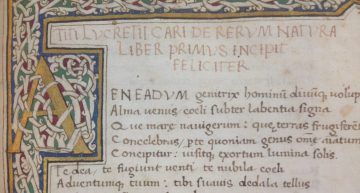Temma Ehrenfeld in AlterNet:
 ‘The pursuit of Happiness’ is a famous phrase in a famous document, the United States Declaration of Independence (1776). But few know that its author was inspired by an ancient Greek philosopher, Epicurus. Thomas Jefferson considered himself an Epicurean. He probably found the phrase in John Locke, who, like Thomas Hobbes, David Hume and Adam Smith, had also been influenced by Epicurus. Nowadays, educated English-speaking urbanites might call you an epicure if you complain to a waiter about over-salted soup, and stoical if you don’t. In the popular mind, an epicure fine-tunes pleasure, consuming beautifully, while a stoic lives a life of virtue, pleasure sublimated for good. But this doesn’t do justice to Epicurus, who came closest of all the ancient philosophers to understanding the challenges of modern secular life.
‘The pursuit of Happiness’ is a famous phrase in a famous document, the United States Declaration of Independence (1776). But few know that its author was inspired by an ancient Greek philosopher, Epicurus. Thomas Jefferson considered himself an Epicurean. He probably found the phrase in John Locke, who, like Thomas Hobbes, David Hume and Adam Smith, had also been influenced by Epicurus. Nowadays, educated English-speaking urbanites might call you an epicure if you complain to a waiter about over-salted soup, and stoical if you don’t. In the popular mind, an epicure fine-tunes pleasure, consuming beautifully, while a stoic lives a life of virtue, pleasure sublimated for good. But this doesn’t do justice to Epicurus, who came closest of all the ancient philosophers to understanding the challenges of modern secular life.
…Epicureans did focus on seeking pleasure – but they did so much more. They talked as much about reducing pain – and even more about being rational. They were interested in intelligent living, an idea that has evolved in our day to mean knowledgeable consumption. But equating knowing what will make you happiest with knowing the best wine means Epicurus is misunderstood. The rationality he wedded to democracy relied on science.
…Its principles read as astonishingly modern, down to the physics. In six books, Lucretius states that everything is made of invisible particles, space and time are infinite, nature is an endless experiment, human society began as a battle to survive, there is no afterlife, religions are cruel delusions, and the universe has no clear purpose. The world is material – with a smidgen of free will. How should we live? Rationally, by dropping illusion. False ideas largely make us unhappy. If we minimise the pain they cause, we maximise our pleasure.
More here.
